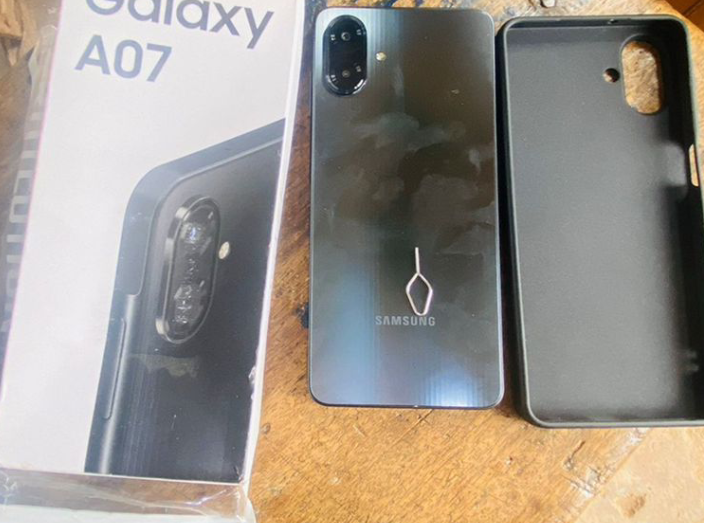
“Keep That Same Energy: Social Media Reacts as Lady Celebrates New Phone Gifted by Her Dad

Social media was thrown into a fresh round of debate after an X user proudly shared the excitement of receiving a brand-new Samsung Galaxy A07 from her father. What started as a wholesome moment of gratitude quickly spiraled into a heated conversation about double standards, entitlement, and how people value gifts depending on who gives them. It was the kind of everyday post that unexpectedly exposes the fault lines in online relationship culture.
The user, identified as B´ (@hellomissbetty), posted with genuine excitement as she flaunted the new phone her father had surprised her with. Her tweet read with the pure innocence of a child thrilled by an unexpected gesture: “Awwww… My man. I just got home and my dad decided to gift me a new phone with pouch and charger head.” Attached to the tweet were photos of a Samsung Galaxy A07 complete with accessories—nothing over the top, but clearly something precious to her.
For many, it was a heartwarming reminder of the simple joys that family can bring—those unprovoked acts of love that do not need to be extravagant to be meaningful. But in typical social media fashion, the conversation didn’t end at “Aww, so sweet.” It soon took an interesting turn.
Responding to the tweet, another user, Grace (omo'badan) @ifetemini, praised the father’s gesture but didn’t stop there. Her reply—equal parts humorous and painfully honest—called out a trend she believes is rampant among young women who accept modest gifts from their parents but turn up their noses when men they’re dating offer the same.
Her response, which has since gone viral, read: “Thank you to your daddy ooo. You see the phone wey person wey born you give you? Him give you wetin he fit afford. Buh let one person son buy you that same phone now, you go don come here come broke-shame am: ‘My friends’ men got them iPhone 17 Pro Max, see what this man gave me, he’s a broke boy.’ Abeg keep that same energy when it’s somebody else’s innocent son’s turn oo0000, appreciate his effort and maintain the same level of joy oo0. T for tenk.”
The comment struck a chord—clearly hitting on an uncomfortable truth. Within minutes, the post had sparked a full conversation across X, with users weighing in on whether she had a point or if she was projecting.
Many agreed with her sentiment, arguing that social media has created unrealistic expectations for romantic relationships. They pointed out that countless people publicly shame their partners for giving them gifts that don’t meet the artificially inflated standards set by influencer lifestyles and luxury culture online. To them, there was nothing wrong with reminding people to appreciate effort over price tag.
Some users echoed the viral response with their own examples of double standards. According to them, a gift from a parent, no matter how simple, tends to be cherished because it is seen as coming from a place of unconditional love. But when the same or even better gift comes from a partner, it is sometimes compared, criticized, or treated as inadequate.
One user wrote, “Na why men no dey buy gifts for some of una again. A man will give you what he can afford, you will now carry your friends’ luxury lifestyle put on top his head.” Another commented, “There’s love in appreciating small things. Today it’s Samsung A07, tomorrow it might be something bigger. Gratitude attracts more blessings.”
But not everyone agreed with the criticism. Some argued that the comparison between parents and romantic partners is unfair. They insisted that expectations in romantic relationships are often shaped by personal preferences, love languages, or even what two people have agreed upon.
A dissenting comment read, “Your dad gifting you something is different from someone you’re dating. Context matters. It’s not entitlement to want certain things from a partner as long as you’re not forcing anyone to meet standards they can’t afford.” Another added, “Parents give from a place of sacrifice. Boyfriends give from a place of choice. It’s normal for people to differentiate how they value the two.”
Even with the mixed reactions, one thing became clear: the conversation reflected a larger cultural discussion about gratitude, financial expectations, and relationship dynamics in the digital age. The viral exchange didn’t just question whether the lady was genuinely appreciative of her father’s gesture. It questioned how society, especially young people, measures love through material things and clout online.
The original poster herself did not respond to the back-and-forth, likely unaware that her innocent celebration had ignited such a discourse. Her post was simply a moment of joy, yet it became the mirror people used to examine their behavior and values.
At the heart of the debate lies one question: Do people truly keep the same energy when gifts come from different sources? It’s a question many are now reflecting on, especially in a world where social media amplifies both gratitude and entitlement.
For some, Grace’s response was a needed wake-up call—one that challenges people to practice consistency in appreciation. For others, it was an unnecessary generalization that ignores the complexities of real relationships. But regardless of where you stand, the conversation has become a reminder of something timeless: the value of a gift should not be determined by the price or the giver’s identity, but by the heart behind it.
In a society where everyday moments are constantly compared, judged, and debated online, the ability to appreciate sincerity—whether from a dad, a partner, or a friend—is rapidly becoming a virtue. And perhaps that is the biggest lesson hidden beneath this viral exchange.
Whether valid or not, the debate revealed that many people are yearning for more authenticity, less pressure, and more gratitude in their relationships. The gift may have been a simple phone, but the conversation it sparked has turned into a mirror reflecting the expectations we place on others and the importance of valuing genuine effort.
And maybe—just maybe—a little more “T for tenk” energy will go a long way.


